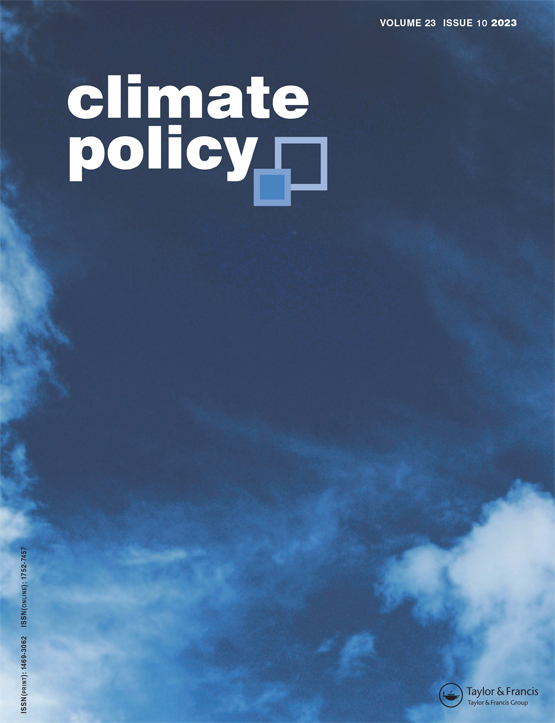Comparison of carbon management and emissions of universities that did and did not adopt voluntary carbon offsets
IF 5.3
1区 社会学
Q1 ENVIRONMENTAL STUDIES
引用次数: 0
Abstract
The urgent need to reduce greenhouse gas emissions, remove carbon from the atmosphere and stabilize natural carbon sinks has led to the development of many carbon management measures, increasingly including voluntary carbon offsets (VCOs). We studied carbon management in universities, institutions with large carbon footprints and considerable influence in climate science and policy fora. However, concerns that VCOs may deter adopters (including universities) from adopting other carbon reduction measures and limit emissions reductions, for example, through moral hazard, have been raised but understudied. We compared the carbon management characteristics (priorities, policies, practices and emissions) of universities that did and did not adopt VCOs. We found adopters measured carbon emissions for longer, and had set targets to reach net zero earlier than had non-adopters. Adopters of VCOs also undertook more carbon management practices in both 2010 and 2020 than non-adopters. We also found that both adopters and non-adopters significantly increased their carbon management practices over the decade studied, but with no difference between groups. Gross CO2 emissions were reduced significantly over time by adopters of VCOs but not by non-adopters, whereas carbon intensity and percentage annual emissions reductions did not relate to adoption status. Consequently, our study showed no indication of mitigation deterrence due to adoption of VCOs at the universities studied. Rather, greater emissions reductions correlated with earlier net zero target dates, and a higher number of policies and carbon management practices. However, our study was constrained to universities that were affiliated with a national environmental network, so research beyond these organizations, and with individuals, would be useful. The survey was voluntary, exposing the study to potential self-selection bias so the findings may not be generalized beyond the study group. Finally, we found the carbon accounting method currently required of universities for scope 1 and 2 emissions may underestimate emissions reductions, particularly for adopters of VCOs. Augmenting the current location-based accounting method with market-based carbon accounts may overcome this.比较采用和未采用自愿碳补偿的大学的碳管理和排放量
减少温室气体排放、从大气中清除碳和稳定自然碳汇的迫切需要导致了许多碳管理措施的发展,其中越来越多地包括自愿碳抵消(vco)。我们研究了大学和碳足迹较大的机构的碳管理,这些机构在气候科学和政策论坛中具有相当大的影响力。然而,vco可能会阻碍采用者(包括大学)采取其他碳减排措施并限制减排(例如,通过道德风险)的担忧已经提出,但尚未得到充分研究。我们比较了采用和未采用vco的大学的碳管理特征(重点、政策、实践和排放)。我们发现,采用者测量碳排放的时间更长,并且比非采用者更早设定了达到净零排放的目标。在2010年和2020年,vco的采纳者比非采纳者承担了更多的碳管理实践。我们还发现,在研究的十年中,采用者和非采用者都显著增加了他们的碳管理实践,但两组之间没有差异。随着时间的推移,采用vco的人的总二氧化碳排放量显著减少,而未采用vco的人则没有,而碳强度和年排放量减少百分比与采用状态无关。因此,我们的研究没有显示由于在所研究的大学中采用vco而产生缓解威慑的迹象。相反,更大的减排与更早的净零目标日期以及更多的政策和碳管理实践相关。然而,我们的研究仅限于隶属于国家环境网络的大学,因此超越这些组织和个人的研究将是有用的。这项调查是自愿的,使研究暴露于潜在的自我选择偏差,因此研究结果可能无法推广到研究组之外。最后,我们发现目前要求大学对范围1和2排放进行碳核算的方法可能低估了排放量,特别是对于采用vco的大学。用基于市场的碳账户来扩大目前基于地点的会计方法可能会克服这个问题。
本文章由计算机程序翻译,如有差异,请以英文原文为准。
求助全文
约1分钟内获得全文
求助全文
来源期刊

Climate Policy
Multiple-
CiteScore
12.90
自引率
8.50%
发文量
102
期刊介绍:
Climate Policy, a prestigious peer-reviewed academic journal, strives to publish outstanding research and analysis on various facets of climate policy such as mitigation and adaptation. Our primary objective is to ensure that our top-notch research is easily accessible and applicable not only to scholars but also policymakers and practitioners. By providing a platform for groundbreaking ideas, pioneering methodologies, and evidence-based insights, our journal aims to contribute to the implementation of an efficient strategy in addressing climate change.
 求助内容:
求助内容: 应助结果提醒方式:
应助结果提醒方式:


